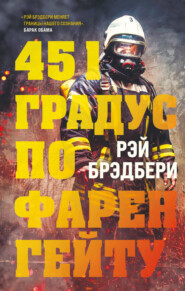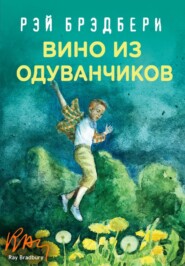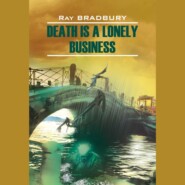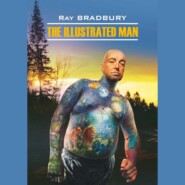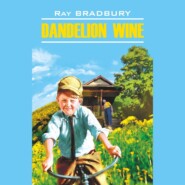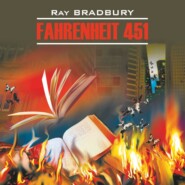По всем вопросам обращайтесь на: info@litportal.ru
(©) 2003-2024.
✖
I Sing the Body Electric
Автор
Год написания книги
2018
Настройки чтения
Размер шрифта
Высота строк
Поля
I believed that.
Whenever I heard Dad say it, tears welled in my eyes. I had seen such ships on Lake Michigan summer morns coming in from festivals across the water full of merry people, confetti on the air, horns blowing, and in my private dream, projected on my bedroom wall through countless nights, there we stood on the dock, Mom, Dad, Skip, and I! and the ship huge, snow-white, coming in with millionaires on her upper decks tossing not confetti but greenbacks and gold coins down in a clattering rain all around, so we danced to catch and dodge and cry Ouch! when hit about the ears by especially fierce coins or laughed when licked by a snow flurry of cash …
Mom asked about it. Dad answered. And in the night. Skip and I went down in the same dream to wait on a dock.
And this night here, lying in bed, after a long while I said, “Dad? What does it mean?”
“What does what mean?” said Dad, way over there in the dark with Mom.
“The message on the egg. Does it mean the Ship? It’ll come in soon?”
There was a long silence.
“Yes,” said Dad. “That’s what it means. Go to sleep, Doug.”
“Yes, sir.”
And, weeping tears, I turned away.
We drove out of Amarillo at six the next morning in order to beat the heat, and for the first hour out we didn’t say anything because we weren’t awake, and for the second hour we said nothing because we were thinking about the night before. And then at last Dad’s coffee started perking in him and he said:
“Ten thousand.”
We waited for him to go on and he did, shaking his head slowly:
“Ten thousand dumb chickens. And one of them, out of nowhere, takes it to mind to scribble us a note.”
“Dad,” said Mom.
And her voice by its inflection said, You don’t really believe?
“Yeah, Dad,” said my brother in the same voice, with the same faint criticism.
“It’s something to think about,” said Dad, his eyes just on the road, riding easy, his hands on the wheel not gripping tight, steering our small raft over the desert. Just beyond the hill was another hill and beyond that another hill, but just beyond that…?
Mother looked over at Dad’s face and hadn’t the heart to say his name in just that way right now. She looked back at the road and said so we could barely hear it:
“How did it go again?”
Dad took us around a long turn in the desert highway toward White Sands, and then he cleared his throat and cleared a space on the sky ahead as he drove and said, remembering:
“Rest in Peace. Prosperity Is Near.”
I let another mile go by before I said, “How much … unh. How much … an egg like that worth, Dad?”
“There’s no putting a human price on a thing like that,” he said, not looking back, just driving for the horizon, just going on. “Boy, you can’t set a price on an egg like that, laid by an inspired chicken at the Inspired Chicken Motel. Years from now, that’s what we’ll call it. The Inspired Chicken Motel.”
We drove on at an even forty miles an hour into the heat and dust of day-after-tomorrow.
My brother didn’t hit me, I didn’t hit my brother, carefully, secretly, until just before noon when we got out to water the flowers by the side of the road.
Downwind from Gellysburg
At eight thirty that night he heard the sharp crack from the theater down the hall.
Backfire, he thought. No. Gun.
A moment later he heard the great lift and drop of voices like an ocean surprised by a landfall which stopped it dead. A door banged. Feet ran.
An usher burst through his office door, glanced swiftly about as if blind, his face pale, his mouth trying words that would not come.
“Lincoln … Lincoln…”
Bayes glanced up from his desk.
“What about Lincoln?”
“He … he’s been shot.”
“Good joke. Now—”
“Shot. Don’t you understand? Shot. Really shot. For the second time, shot!”
The usher wandered out, holding to the wall.
Bayes felt himself rise. “Oh, for Christ—”
And he was running and passed the usher who, feeling him pass, began to run with him.
“No, no,” said Bayes. “It didn’t happen. It didn’t. It couldn’t. It didn’t, couldn’t…”
“Shot,” said the usher.
As they made the corridor turn, the theater doors exploded wide and a crowd that had turned mob shouted or yelled or screamed or stunned simply said, “Where is he?” “There!” “Is that him?” “Where?” “Who did it?” “He did? Him?” “Hold him!” “Watch out!” “Stop!”
Two security guards stumbled to view, pushed, pulled, twisted now this way and that, and between them a man who struggled to heave back from the bodies, the grasping hands and now the upflung and downfell fists. People snatched, pecked, pummeled, beat at him with packages or frail sun parasols which splintered like kites in a great storm. Women turned in dazed circles seeking lost friends, whimpering. Men, crying out, shoved them aside to squirm through to the center of the push and thrust and backward-pumping guards and the assaulted man who now masked his cut face with splayed fingers.
“Oh God, God.” Bayes froze, beginning to believe. He stared upon the scene. Then he sprang forward. “This way! Back inside! Clear off! Here! Here!”
And somehow the mob was breached, a door cracked wide to shove flesh through, then slammed.
Outside, the mob hammered, threatening damnations and scourges unheard of by living men. The whole theatre structure quaked with their muted wails, cries and estimates of doom.
Bayes stared a long moment at the shaken and twisted door-knobs, the chattering locks, then over to the guards and the man slumped between them.
Bayes leaped back suddenly, as if an even fresher truth had exploded there in the aisle.
Dimly, he felt his left shoe kick something which spun skittering like a rat chasing its tail along the carpeting under the seats. He bent to let his blind hand search, grope, find the still-half-warm pistol which, looked at but disbelieved, he shoved in his coat pocket as he backed down the aisle. It was a full half minute before he forced himself to turn and face the inevitable stage and that figure in the center of the stage.






